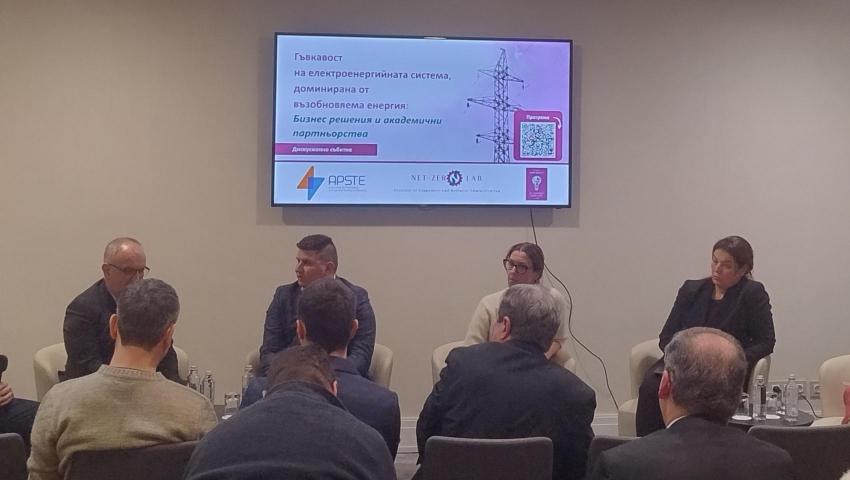Over 4,700 MW of solar power plants have been connected to our energy system
Up to 70% of the electricity during spring or autumn days is expected to come from solar power plants. Bulgaria lags behind in wind power plants

Solar energy could reach 60-70% of the total electricity production in Bulgaria during some parts of the day, as early as this spring, if the forecasts of the Electricity System Operator (ESO) come true. So far, over 4,700 MW of solar power plants have been built and connected in our country.
This happened within the framework of a discussion forum organized by the Association for Production, Storage and Trading of Electricity (APSTE) and the scientific and applied laboratory Net-Zero Lab at the Faculty of Economics of Sofia University. The event was on the topic "Flexibility of the electricity system dominated by renewable energy" and brought together leading experts from the energy sector, state administration and academia, the organizers recall.
After the changes introduced in the balancing market last year, the problems with balancing the electricity system are under control, said Dimitar Zarchev, Director of the Central Dispatching Department (CDD) at the Electricity System Operator (ESO). "We expect new challenges in the spring. Forecasts show that in some parts of the day, solar energy can reach 60-70% of total production. Energy storage batteries will help with more precise balancing, but their large-scale implementation takes time,” Zarchev added. According to him, the main challenge facing the grid operator will be to preserve system services such as voltage regulation, resilience reserve and others, which will require the implementation of new technological solutions.
During the discussion, Deputy Minister of Energy Iva Petrova emphasized the Ministry of Energy’s commitment to developing the regulatory framework that would facilitate the introduction of new storage technologies and the integration of renewable sources into the electricity system.
“Renewable energy guarantees cheap electricity for households and businesses. Storage systems will help build more new RES that will reduce our bills,” said Nikola Gazdov, Chairman of the Bulgarian Electricity and Gas Association. “Batteries alleviate challenges related to the variable nature of renewable sources and their balancing,” added Gazdov. He warned that no new wind turbines have been built for a decade due to procedural obstacles and negative propaganda. “Bulgaria urgently needs new wind farms so that we can have cheap electricity even when the sun is not shining.”
“We are actively working to build bridges between academia, business and state institutions, because only through coordinated efforts can we guarantee a sustainable and balanced energy system,” said Prof. Sonya Mileva-Bozhanova, Deputy Rector of Sofia University. She welcomed the partnership between APSTE and Net-Zero Lab, emphasizing that the Faculty of Economics of Sofia University is committed to supporting the energy transformation through the preparation of highly qualified personnel and innovations in their training.
Dr. Maria Trifonova from Net-Zero Lab emphasized that the academy is ready to support the process with qualitative analyses and modeling of various scenarios for the development of the electricity system. “The Net-Zero Lab is open to cooperation with institutions and businesses to support informed decision-making based on real data,” she said. From there, I presented my analysis of the development of solar and battery energy storage systems in our country.
“Artificial intelligence and algorithmic trading are already an integral part of the optimization of RES plants,” commented Stefan Dechkov, COO of Adex Energy. “The digital solutions developed in Bulgaria are at a very high level. We are already working with algorithms that constantly compete with each other to optimize the results for our clients and for the system as a whole,” he commented.
Petya Dimova, Director of Electricity Trading at Enery, presented the company’s vision for investments in energy storage. “We are investing in our own projects for storage and asset management in Bulgaria and the region. Thanks to the digitalization of energy trading, we are able not only to protect ourselves from market shocks, but also to benefit from them,” she said.
At the moment, battery-type energy storage systems are widely available on the market, which can supply electricity to the grid for up to 2 hours, as became clear during the discussion. At the same time, businesses are looking for stable, baseload energy on which to rely on around the clock.
However, technologies are developing and there is already a demand even for seasonal energy storage. At the moment, it is mainly carried out with the technologies of the PVPP. For system operators, an important issue to solve is the secondary and tertiary regulation as well as the inertia of the system. Such services cannot be offered by renewable sources at the moment.
